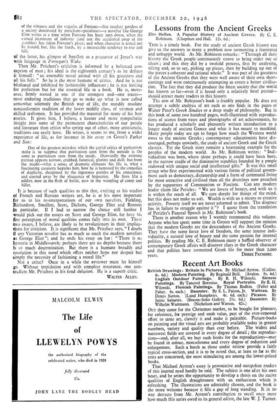Lessons from the Ancient Greeks
Zito Hellas. A Popular History of Ancient Greece. By C. E. Robinson. (Chapman and Hall. 12s. 6d.)
THIS is a timely book. For the study of ancient Greek history can give us the answers to many a problem now tormenting a frustrated and unhappy world. As Mr. Robinson remarks : " Through all their history the Greek people continuously strove to bring order out of chaos ; and this they did by a twofold process, first by analysing, sifting and, so to say, picking up pieces, then by building up out of the pieces a coherent and rational whole." It was part of the greatness of the Ancient Greeks that they were well aware of their own short- comings and were continuously attempting to create a better civilisa- tion. The fact that they did produce the finest society that the world has known so far—even if it lasted only a relatively brief period— should attract many readers to this history.
The aim of Mr. Robinson's book is frankly popular. He does not attempt a subtle analysis of art such as one finds in the pages of Walter Pater's Greek Studies or a deep study of philosophy. But in this book of some two hundred pages, well-illustrated with reproduc- tions of scenes from vases and photographs of art achievements, he has produced a scholarly and pleasantly written introduction to a longer study of ancient Greece and what it has meant to mankind. Many people today are apt to forget how much the Western world owes to the ancient Greeks ; contemporary educationists have dis- couraged, perhaps unwisely, the study of ancient Greek and the Greek classics. Yet the Greek story remains a heartening example for the peoples of the modern world. As Mr. Robinson writes : " Indi- vidualism was born, where alone perhaps it could have been born, in the narrow cradle of the diminutive republics founded by a people endowed with unique social and intellectual gifts." It was this small group who first experimented with various forms of political govern- ment such as democracy, dictatorship and a form of communal living far more attractive and civilised than all the doctrines now preached by the supporters of Communism or Fascism. Can any modern leader claim like Pericles : " We are lovers of beauty, and with us it is within the reach of all. We care deeply for things ,of the mind, but this does not make us soft. Wealth is with us a means to creative activity. Poverty itself we are never ashamed to admit. The disgrace lies in failure to struggle against it "? I quote from the translation of Pericles's Funeral Speech in Mr. Robinson's book.
There is another reason why I warmly recommend this volume. Anyone who has spent some time in Greece will support the opinion that the modern Greeks are the descendants of the Ancient Greeks. They have the same fierce love of freedom, the same intense indi- viduality, a natural love of beauty and the same passion for internal politics. By reading Mr. C. E. Robinson many a baffled observer of contemporary Greek affairs will discover clues to the Greek character and that politics have tormented Greek life for more than 2,000


































 Previous page
Previous page